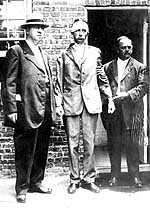** 06-Jan-2021 World View: Capitol bombing -- July 2, 1915
Bomb Rocks Capitol
July 2, 1915

Photo of Muenter's Arrest
A solitary figure slipped quietly into the Capitol on the Friday
afternoon leading to a Fourth of July weekend. He cradled a small
package containing three sticks of dynamite. The former professor of
German at Harvard University, Erich Muenter, came to Washington to
deliver an explosive message. Although the Senate had been out of
session since the previous March and was not due to reconvene until
December, Muenter headed for the Senate Chamber. Finding the chamber
doors locked, he decided that the adjacent Senate Reception Room would
serve his purposes. He worked quickly, placing his deadly package
under the Senate's telephone switchboard, whose operator had left for
the holiday weekend. After setting the timing mechanism for a few
minutes before midnight to minimize casualties, he walked to Union
Station and purchased a ticket for the midnight train to New York
City.
At 20 minutes before midnight, as he watched from the station, a
thunderous explosion rocked the Capitol. The blast nearly knocked
Capitol police officer Frank Jones from his chair at the Senate wing's
east front entrance. Ten minutes earlier, the lucky Jones had closed a
window next to the switchboard. A 30-year police veteran, the officer
harbored a common fear that one day the Capitol dome would fall into
the rotunda. For a few frantic moments, he believed that day had
come. Jones then entered the Reception Room and observed its
devastation—a shattered mirror, broken window glass, smashed
chandeliers, and pulverized plaster from the frescoed ceiling.
In a letter to the Washington Evening Star, published after the blast,
Muenter attempted to explain his outrageous act. Writing under an
assumed name, he hoped that the detonation would "make enough noise to
be heard above the voices that clamor for war. This explosion is an
exclamation point in my appeal for peace." The former German professor
was particularly angry with American financiers who were aiding Great
Britain against Germany in World War I, despite this country's
official neutrality in that conflict.
Arriving in New York City early the next morning, Muenter headed for
the Long Island estate of J. P. Morgan, Jr. Morgan's company served as
Great Britain's principal U.S. purchasing agent for munitions and
other war supplies. When Morgan came to the door, Muenter pulled a
pistol, shot him, and fled. The financier's wounds proved superficial
and the gunman was soon captured. In jail, several days later, Muenter
took his own life.
Reference Items:
U.S. Congress. Senate. History of the United States Capitol: A
Chronicle of Design, Construction, and Politics, by William
C. Allen. 106th Congress, 2d sess., 2001. S. Doc. 106-29.
https://www.senate.gov/artandhistory/hi ... apitol.htm
